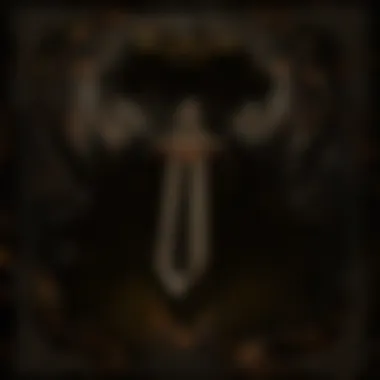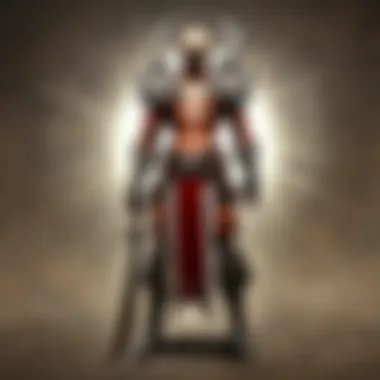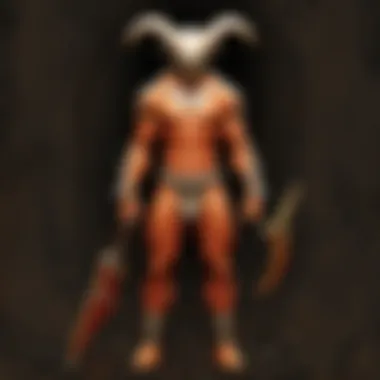Mastering Item Purchases in Diablo 2: A Complete Guide


Intro
The world of Diablo 2 is rich and varied, offering players numerous ways to enhance their gameplay experience through item acquisition. Understanding the intricacies of purchasing items not only affects player performance but also significantly impacts the in-game economy. This guide aims to provide a thorough examination of the various methods available to players looking to acquire items—be it through in-game purchases, online marketplaces, or community trading. Moreover, we will delve into the ethical implications of item transactions, ensuring players can engage in this aspect of the game responsibly.
As the game has evolved, recent updates have introduced new features and mechanics. Thus, familiarizing oneself with these changes is crucial for maximizing the benefits of the available purchasing options. Incorporating both the latest strategies and insights, this guide will be an essential resource for both novice and veteran players alike, helping them navigate the complex landscape of item acquisition in Diablo 2.
Understanding Diablo Item Economy
The item economy in Diablo 2 holds significant meaning for both casual players and veterans alike. Understanding this economy can profoundly shape the gameplay experience. The core element of the economy revolves around the value and rarity of items available in the game. This section intends to shed light on the intricacies of item trading and purchasing strategies, along with their impact on one's gaming journey.
Historical Context of Item Trading
Diablo 2 has a rich history that dates back to its initial release in 2000. The game's design, along with the community that formed around it, has led to a robust trading culture. Initially, players relied on basic in-game mechanics to trade items. This included bartering within the game using chat features or trading directly in person.
As time passed, external factors began to influence trading. For example, rare items became more sought after, resulting in inflated prices. Forums and communities, such as those on Reddit and dedicated websites, emerged to facilitate trading discussions. These platforms allowed players to share information about rarity and average prices. Over the years, this trading culture helped to establish unofficial value systems, guiding players on what items were worth and how to trade them efficiently.
Current Trends in Item Purchases
Today, the item purchasing landscape in Diablo 2 reflects both nostalgia and strategic gameplay. With the advent of online marketplaces, players engage in buying and selling items with more transparency. The current market trends suggest a few key observations:
- Price Fluctuations: Prices vary significantly based on item rarity and demand. Popular items can see their price skyrocket due to trends in gameplay or community interest.
- Collector's Market: Some players are shifting towards collecting rather than purely using items. This trend has opened up new avenues for trading and pricing strategies.
- Cross-Platform Trading: With the release of Diablo 2: Resurrected, cross-platform trading has become popular. Players now participate in a more global economy.
As players navigate these current trends, it remains essential to consider the broader implications on gameplay. Engaging with the economy of Diablo 2 can mean the difference between having a fulfilling experience versus constant frustration over item acquisition.
In-Game Item Purchases
In-Game purchases in Diablo 2 hold significant value for players. Engaging in these transactions allows gamers to acquire essential items that enhance their gameplay experience. The in-game economy facilitates a structured environment where players can trade within constraints that balance gameplay and enjoyment. This section will clarify how the in-game store functions and how item rarity influences pricing, both crucial elements for savvy players.
Understanding the In-Game Store
The in-game store, managed by non-player characters (NPCs), offers a range of items that are essential for player progression. Items available include potions, weapons, armor, and other useful tools that players might need. Each NPC has specific inventory, and the type of items they sell varies based on the player's advancement in the game.
Importantly, familiarize yourself with the pricing structures of these items. Regularly check what each NPC offers. If an item is priced too high relative to its utility, it could point towards overpricing strategies that gamers should avoid. The in-game store also includes unique items available for trade, creating opportunities for players to find rare gear that not only serves functionally but also adds to their character's aesthetic.
Shopping in the in-game store is not merely about acquiring items; it also involves understanding inventory reset mechanics. Each town has its unique store inventory, which refreshes periodically. Players can exploit these resets to find desirable items. Hence, patience and observation are key.
Item Rarity and its Impact on Pricing
Item rarity is a central concept in the Diablo 2 economy. The game implements a categorization system where items range from common to unique, mystical, and rare. Understanding this hierarchy is critical in evaluating the worth of potential purchases.
Key aspects to consider include:
- Rarity Levels: Differentiating between common, rare, and unique items allows players to strategize their purchases effectively. Rare items tend to have higher stats, making them significantly more valuable.
- Demand: The demand for specific items fluctuates. For example, some players actively search for high-level runes or powerful weapons, which leads to higher prices.
- Game Updates: Changes in the game can shift the rarity and desirability of items. New content or patches may introduce powerful items that disrupt the existing market.
"The rarity of an item not only dictates its price but also influences player strategies in trade and acquisition."
Recognizing these factors can inform players' decisions about buying items in the store. Always keep an eye on the latest trends in item rarity; it directly translates to economic value, character builds, and overall player advancement. Understanding both the store mechanics and item rarity can bolster one's ability to navigate purchases efficiently.
Third-Party Online Marketplaces
Third-party online marketplaces play a significant role in the item economy of Diablo 2. These platforms provide players with an accessible means to trade items and acquire rare gear, beyond what the in-game mechanics offer. Understanding how to navigate these marketplaces can enhance a player’s experience, opening up new opportunities for item acquisition.
Navigating Online Marketplaces


Finding your way around various online marketplaces requires some basic strategies. Websites like Reddit and forums dedicated to Diablo 2 allow players to post trade offers, while dedicated trading websites provide structured interfaces for listing items.
When exploring these platforms, it is essential to filter searches based on the item type, rarity, and price. Keeping an eye on user feedback can greatly improve decision-making. Some marketplaces even feature a rating system to gauge seller reliability, which can save you from potential pitfalls.
Evaluating Market Risks and Rewards
Evaluating the risks and rewards of engaging in third-party marketplaces is crucial for your success.
Assessing Seller Reputation
Assessing seller reputation is one of the most critical aspects of trading in online marketplaces. The reputation of a seller often reflects their reliability and commitment to fair transactions. Positive feedback, high response rates, and a history of successful trades are hallmark indicators of a trustworthy seller.
Buyers benefit from engaging with reputable sellers, as this reduces the likelihood of scams or disappointing trades. However, a lack of information about a seller can be a red flag. Always look for sellers with established records before conducting transactions.
Price Fluctuations
Price fluctuations can significantly impact your buying strategy. The value of items can change based on demand, new game updates, or changes within the community. Players should be vigilant in tracking these changes. It is wise to observe trends before making large purchases.
Market research can help you determine a fair price range for items you want and help ensure you do not overpay.
Scams and Fraud Prevention
Scams and fraud prevention are vital topics when discussing third-party marketplaces. They exist in every online trading environment, and awareness is crucial. You can protect yourself by using escrow services or insisting on specific transaction methods, such as PayPal's buyer protection, which can mitigate risk.
Staying informed on common scam tactics, such as impersonation or phishing attempts, is essential. Always approach trades with caution, especially when dealing with unfamiliar parties.
"Vigilance is key when entering third-party marketplaces. The benefits can be great, but so can the threats."
Navigating third-party online marketplaces in Diablo 2 offers exciting opportunities for item acquisition. However, players need to approach these platforms with a strategic mindset, considering the various risks involved. With strategic assessment and due diligence, you can enhance your gaming experience through successful transactions.
The Role of Trading Communities
Trading communities are a cornerstone of the item purchasing ecosystem in Diablo 2. They provide players with a platform where interaction and exchange flourish, allowing for access to a vast array of items not readily available through standard gameplay. These communities enhance the player experience by fostering social connections and enabling tailored item acquisition that suits individual needs.
One significant benefit to engaging with trading communities is the opportunity to obtain rare items. Certain unique items or high-value gear may not appear in personal gameplay, making trading an essential strategy. By participating actively in these communities, players can negotiate trades that add valuable assets to their inventory.
Additionally, trading communities often serve as information hubs. Players share their knowledge, including tips about potential item values, trends in the economy, and strategies for maximizing trades. One can learn the best ways to approach trading, which can ultimately save time and enhance gameplay efficiency.
Finding Trading Platforms
Identifying reliable trading platforms is crucial for effective engagement in Diablo 2's item economy. Numerous channels exist, including forums, social media groups, and dedicated trading websites. Each platform has its unique user base and set of rules, making it essential to choose one that aligns with your trading goals.
Popular options to explore include:
- Reddit: Specific subreddits dedicated to Diablo 2 trading offer structured environments for discussions and exchanges.
- Facebook Groups: Various groups exist focused on Diablo 2, where players can post trade requests and negotiations.
- Dedicated Trading Sites: Websites specialized in game item trading can provide tools and systems to facilitate safe exchanges.
Finding a platform that suits your needs can improve your trading experience. Use platforms that are active and have established methods for participant accountability.
Building Trust in Trading
Building trust within trading communities is vital for successful transactions. The online environment can occasionally harbor dishonest players, making it essential to develop a good reputation and recognize trustworthy partners.
Here are effective methods to establish trust:


- Engage in community discussions: Being an active member, contributing valuable insights or assistance helps to build rapport and credibility.
- Utilize feedback systems: Some platforms might have feedback mechanisms where players can rate their trading experiences. This could help in choosing reliable trading partners.
- Start with small trades: When dealing with new partners, initiate transactions involving lesser valuable items to assess their reliability. This builds confidence gradually.
Establishing a trustworthy network aids in refining the trading experience, leading to smoother and more beneficial exchanges.
"Trust is built rather than given; it is essential for successful trading in an online economy."
Communities remain a powerful resource for any Diablo 2 player aiming to optimize their item acquisition strategy.
Strategic Considerations for Buying Items
Understanding strategic considerations when buying items in Diablo 2 is vital for enhancing your gameplay experience. These considerations affect not only the types of items you acquire but also how effectively you use them in various situations. Formulating a strategy that aligns with your character's needs can directly impact both your efficiency in-game and overall enjoyment.
One significant aspect of this strategy is the timing of your purchases. Buying items at the right moment can save resources and yield better deals. This means observing market dynamics, understanding price trends, and knowing when to invest or hold back on spending. Additionally, targeting specific item types suited for your character can vastly improve your performance, whether in Player vs Player (PvP) or Player vs Environment (PvE) settings.
Timing Your Purchases
Timing your purchases can be the difference between acquiring a sought-after item and missing out. The Diablo 2 item market is dynamic, with prices influenced by player demand and game events. Being aware of these fluctuations can help you secure advantageous deals.
For example, during specific in-game seasons or events, demand for certain items may spike, leading to inflated prices. Conversely, prices might drop during periods of lower player activity. Keeping an eye on the communities where items are traded can alert you to these trends.
"Understanding when to buy is as crucial as knowing what to buy. Market awareness can maximize your investment."
Targeting Specific Item Types
Targeting specific item types is an effective method to streamline your acquisition process. Identifying what you need based on your class and play style will enhance gameplay significantly. Whether you focus on offense, defense, or utility items, knowing what works best for your character offers a edge.
Maximizing Class Synergy
Maximizing class synergy means equipping your character with items that bolster their inherent strengths. For instance, a Sorceress benefits from items that enhance spell damage or reduce mana costs, making them more effective in battles.
This approach is beneficial because it aligns your gear with your character's abilities, allowing for optimized performance. A well-synergized build can handle tougher challenges and improve your overall game experience.
However, focusing too narrowly on a particular synergy can also limit your versatility. Being adaptable while maintaining synergy is an approach many players find useful.
Specialized Items for PvP vs. PvE
Differentiating between specialized items for PvP and PvE is essential. PvP environments require gear that enhances survivability and offensive strategies, while PvE focuses more on maximizing damage and clearing abilities.
This distinction is important because using the wrong equipment in either scenario can lead to subpar performance. For example, a weapon suited for PvP may not deal enough damage in PvE situations, putting you at a disadvantage.
Identifying these specialized items allows players to strategize their purchases better and make sure their gear aligns with their current objectives. This approach not only enhances winning potential but also maintains a level of engagement in different aspects of Diablo 2.
Ethical Considerations in Item Purchasing
In the context of Diablo 2, ethical considerations surrounding item purchasing play a crucial role in shaping the player's experience. The significance of these considerations lies in the balance between enhancing personal gameplay and maintaining the integrity of the game environment. As the digital economy of Diablo 2 evolves, players must reflect on how their purchasing decisions influence not only their own progression but also the broader community.
The act of buying items can sometimes skew the intended difficulty and challenge of the game. Take, for instance, the acquisition of powerful gear through real money transactions. This can lead to a disadvantage for players who invest time and effort into grinding for similar items. Therefore, thinking critically about these decisions is important. Players should weigh the benefits against the impact on community dynamics.
Understanding engaging with the game's economy ethically can enhance the overall experience for all. Not only does it ensure fair competition, but it also contributes to a sense of accomplishment derived from playing the game as it was designed.
Understanding the Impact of Item Buying
When players buy items, it creates immediate gratification that can be tempting. However, this action can significantly alter personal and community experiences within Diablo 2.


- Community Dynamics: Excessive item buying can create an unbalanced environment. New and casual players might feel discouraged, knowing they are competing against those with purchased advantages.
- Game Satisfaction: Players who buy powerful items may not enjoy the same level of satisfaction as those who work to earn them through gameplay. There is an inherent value in the journey of acquiring in-game wealth.
- Perceived Value: The value of items can diminish if purchasing items excessively becomes widespread. The rarity of items and their subsequent value can become skewed, affecting trading and interactions in-game.
"Buying items can offer a shortcut to power, but it often removes the soul of what makes games engaging."
Balancing Fair Play and Progression
Balancing fair play and progression is an essential aspect of enjoying Diablo 2. Players must navigate how their purchases affect the game environment and their fellow players.
- Fair Competition: Players should engage in item purchasing with the intent to maintain equitable competition. Buying items should not become a way to dominate the game.
- Self-Regulation: It is vital for players to self-regulate their behavior regarding item purchases. Creating personal rules can help maintain the challenge and enjoyment of the game.
- Community Focus: Being part of a gaming community means considering the collective enjoyment. Prioritize fair play and consider how purchasing decisions affect the game's longevity and enjoyment for all users.
In essence, ethical considerations in purchasing items are multifaceted. Understanding the impact of item buying and striving for fair play creates a richer experience for every player in Diablo 2.
Best Practices for Safe Transactions
Engaging in transactions for in-game items requires careful navigation to ensure a secure and smooth experience. The virtual item economy, much like real-world markets, carries risks. Practicing sound transaction strategies can mitigate the dangers associated with buying or selling items. Here, we will delve into key practices that establish a safer environment for gamers as they pursue their item acquisition goals.
Using Escrow Services
Escrow services act as a trusted third party in item transactions. This intermediary holds the item and payment until both parties fulfill their obligations. This is particularly useful in online gaming, where the risk of scams is higher. By using an escrow service, sellers can ensure they receive payment before relinquishing their items. Conversely, buyers can rest assured that they will receive their purchased items before the payment is released to the seller.
Some popular escrow services include
- Player Auctions
- Diablo 2 Resurrected Trade
These platforms offer user-friendly interfaces and detailed transaction guidance. Moreover, users can often review feedback and ratings of other participants to verify their trustworthiness. An escrow service elevates safety by providing accountability, reducing anxiety involved in unknown transactions.
Documenting Transactions
Documentation serves an essential role in safeguarding interests in item trades. Maintaining accurate records can help resolve disputes, should they arise. Important details to document include:
- The Date and Time of Transaction
- Item Details: Name, Type, Rarity
- Agreed Terms: Price, Payment Method
- Screenshots of Conversations: Especially if a chat platform is used
Having this information recorded creates a reliable reference point for all parties involved. In situations where misunderstandings occur, clear documentation can support claims and facilitate resolution. It is recommended to keep all communications in one designated area for easy access.
Citing agreements and expectations can prevent potential issues and foster smoother exchanges. By prioritizing safety through documentation, the whole experience becomes more pleasant and less fraught with anxiety.
"Taking precautions in your transactions not only protects your assets but also enhances community trust."
Future Outlook on Diablo Item Economy
Understanding the future of the item economy in Diablo 2 is essential for players aiming to strategize their purchases effectively. Changes in the game can have immediate and profound impacts on the value of items, player spending habits, and overall in-game economy. As the game continues to attract new players and retain longtime fans, it becomes crucial to keep an eye on potential updates and shifts in player preferences that influence item transactions.
Potential Changes with Game Updates
Game updates can significantly influence the item economy. Blizzard frequently introduces patches that adjust item drop rates, balance character abilities, and modify trading mechanics. Each update can lead to fluctuations in item prices, creating opportunities as well as risks for players.
For instance, if a patch increases the drop rate of specific rare items, the market value of these items might decline due to increased availability. Conversely, the introduction of new, highly sought-after items can drive up prices, making these updates a double-edged sword for item buyers. Staying informed about upcoming patch notes and community discussions is critical.
"Changes in game dynamics can reshape the value of items, thus altering purchasing strategies."
Adapting to Evolving Player Needs
Player needs are continually evolving, influenced by shifts in gameplay styles, emerging meta strategies, and community preferences. As more players explore the various aspects of Diablo 2, from PvP to PvE activities, their demand for specific items will change.
For example, if players begin favoring certain character builds, the items that enhance these builds will see an increase in demand. In contrast, items that no longer serve optimal strategies may decrease in interest.
To effectively navigate this landscape, players should:
- Monitor Community Trends: Regularly check forums like Reddit, or social media platforms to gauge what items are gaining traction among the player base.
- Participate in Trading Communities: Engaging with trading platforms can provide insights on the most sought-after items and their market value.
- Prepare for Changes: Being adaptable in your purchasing strategies will allow for better decision-making when the market shifts.



